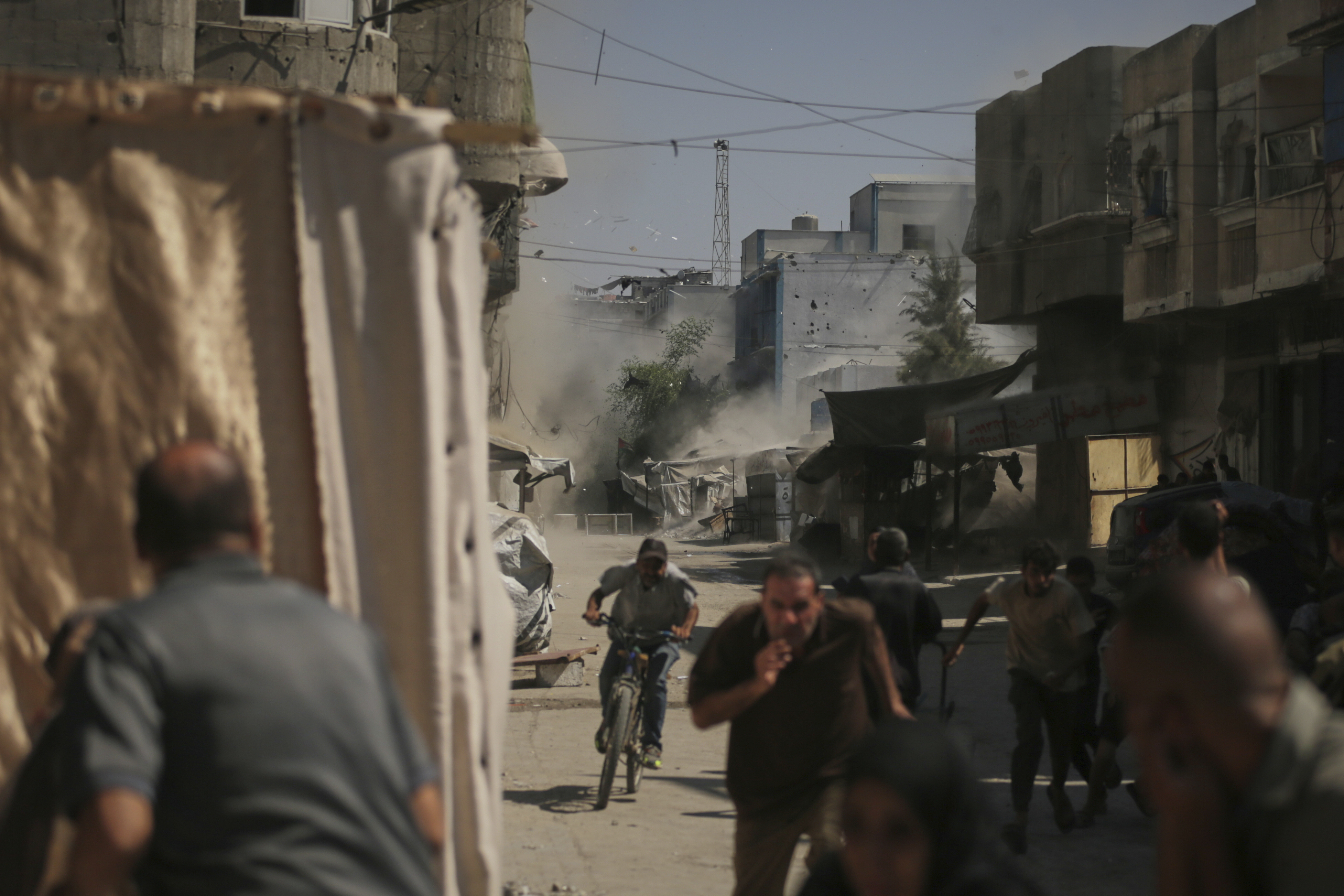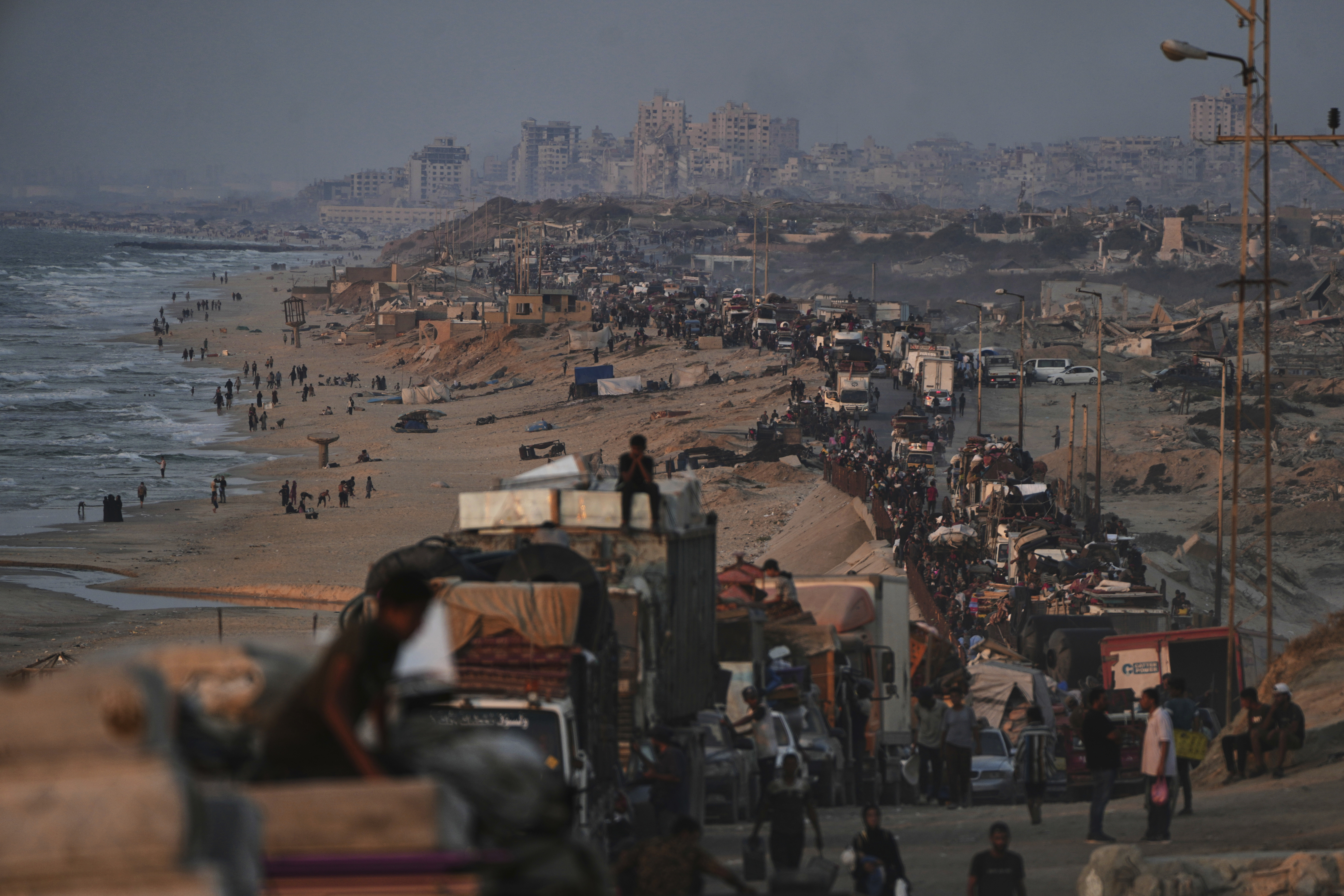
UNITED NATIONS/JERUSALEM/BEIJING/AMMAN - The United States on Thursday vetoed a UN Security Council draft resolution that would have demanded Israel immediately lift all restrictions on humanitarian access and delivery in Gaza.
The draft would have also called for an immediate, unconditional and permanent ceasefire in Gaza and for the unconditional, dignified and immediate release of all hostages held by Hamas and other armed groups.
The draft, initiated by the 10 elected members of the Security Council, won 14 votes in favor among the 15-member council. The United States, a permanent member of the council, has veto power.
2 Israelis killed
A gunman opened fire Thursday at the Allenby Bridge, a key crossing between the Israeli-occupied West Bank and Jordan, killing two Israelis before being shot dead, according to the Israel Defense Forces (IDF) and emergency service Magen David Adom (MDA).
The MDA said the victims, men in their 60s and 20s, were found unconscious and later pronounced dead after resuscitation efforts failed.
The IDF said the attacker drove a humanitarian aid truck from Jordan to the crossing, which is jointly operated by Israel and Jordan. Israel's Kan TV, citing a security source, reported the shooter was a Jordanian national employed by the Jordanian army to deliver the aid shipment to Gaza.
According to the report, the man exited the truck and opened fire, but his rifle jammed. He then drew a knife and stabbed the victims before being shot by an Israel Airports Authority security guard.
The IDF said that following the incident, its forces began searching the area and surrounded the nearby Palestinian West Bank city of Jericho.
Ground offensive
Israel has officially launched a ground offensive into Gaza City, triggering a wave of international condemnation.
Local media reported that Israeli tanks and military vehicles pushed into Gaza City late Monday following heavy airstrikes. Gaza's health authorities said Wednesday that Israeli fire in the previous day had killed 98 people and wounded 385.
United Nations Secretary-General Antonio Guterres warned on Tuesday that Gaza City is facing "systematic destruction" and described the situation as "morally, politically and legally intolerable." The UN High Commissioner for Human Rights also urged Israel to stop the "wanton destruction of Gaza."
On the same day, the UN Independent International Commission of Inquiry on the Occupied Palestinian Territory, including East Jerusalem, and Israel concluded that Israel's actions in Gaza constitute genocide, while Israel rejected the accusation, dismissing the report as "cherry-picked" and "fake."
China voiced strong opposition on Wednesday. Chinese Foreign Ministry Spokesman Lin Jian said his country firmly opposes Israel's escalation of military operations in Gaza and condemns all moves that harm civilians and violate international law.

Civilian lifelines
The last remaining civilian lifelines are collapsing in Gaza City as Israel's military onslaught triggers more casualties, mass displacement, destruction, and tighter restrictions on humanitarian work, UN humanitarians said on Thursday.
The UN Office for the Coordination of Humanitarian Affairs (OCHA) said that in just the past five days, 11 emergency shelters for about 11,000 people in Gaza City have taken direct or indirect hits. The shelters were located on the premises of the UN Relief and Works Agency for Palestine Refugees in the Near East.
OCHA said that its partners tracking the movement of people reported that the number of displacements within the Gaza Strip is rising fast, now exceeding 1 million since the ceasefire collapsed in mid-March. As of Wednesday, 200,000 displacements were recorded from northern to southern Gaza over the past month, including 56,000 since Sunday.
"OCHA is alarmed by increasing reports of displaced families sleeping on the streets or in makeshift tents and struggling to survive," the office said. "Despite heavy restrictions, the United Nations and its partners are doing everything possible to reach people across Gaza with life-saving support."
OCHA said its efforts to provide relief are not without challenge. Zikim, the only crossing directly into the north, where famine has been confirmed, has been shut since the weekend.
The office said that Israeli authorities have also classified some food items, such as peanut butter, as "luxuries" not to be allowed in, leaving large amounts of already-procured aid stuck outside Gaza. Inspection rules vary by route, creating unpredictability and needless delays.
Within Gaza, OCHA said some humanitarian movements were also blocked.
Just Wednesday, three of 14 coordinated movements were denied, including two intended to bring food to the north. Two other missions faced obstacles that meant they could only be partially completed or were prevented from being carried out.
The office said the obstacles wasted time and human resources, missed opportunities to reach people in need, and exposed aid workers to unnecessary risks.
"The aid reaching people falls far short of what they need, and the cost is measured in lives," the office said. "OCHA warns that opportunities to support starving people are being systematically blocked. Every week, new restrictions are imposed."
OCHA released a summary on Thursday of what relief the world body and its partners were able to deliver in the first half of the month.
The office said that to tackle famine and food insecurity, humanitarian teams collected over 12,500 tonnes of wheat flour, food parcels and bulk supplies from the Israeli-controlled crossings. They served nearly 560,000 meals daily through 116 kitchens and provided 10,000 loaves of bread to those moving to the south.
OCHA said to address cases of malnutrition, the United Nations and its partners continued to screen children and enroll them for treatment.
The UN Children's Fund reported dispatching over 200,000 packs of nutrient-rich baby food to partners, enough to support over 63,000 infants and young children for two weeks. They also dispatched 10,000 boxes of high-energy biscuits, enough to assist more than 10,000 acutely malnourished pregnant and breastfeeding women for one month.
"We need a ceasefire, we need hundreds of trucks every day, safe and open routes. We need an end to bureaucratic delays. We need restoration of power and water, and more meaningful commercial imports," Stephane Dujarric, chief spokesman for UN Secretary-General Antonio Guterres, said at a regular briefing.
"We need the release of all the hostages that are still being held in Gaza by Hamas and other groups, immediately and unconditionally and we need arbitrarily detained Palestinians freed from Israeli detention centers," he added.
ALSO READ: China condemns Israeli attack on Qatar at UN Human Rights Council
Deadly attack
Jordan on Thursday announced an investigation into a deadly shooting at the Israeli side of the King Hussein Bridge (Allenby Bridge) crossing, condemning the incident as a violation of law and a threat to its role in facilitating humanitarian aid to Gaza.
In a statement, Jordan's Foreign Ministry said the country rejects all acts of violence and unlawful actions that endanger its interests and humanitarian mission.
The attacker, identified as Abdul-Muttalib Al Qaisi, a 1968-born Jordanian who had been working for three months as a driver for Gaza aid convoys, reportedly drove a humanitarian aid truck from Jordan to the crossing, according to the ministry.
According to the Israel Defense Forces (IDF), Al Qaisi exited the truck and attempted to shoot victims on Thursday, but his rifle jammed. He then drew a knife and stabbed the victims before being shot by an Israeli security guard.
Jordan's Foreign Ministry said it is coordinating with relevant agencies to monitor the conditions of Jordanian aid drivers who delivered goods through the crossing earlier in the day, ensuring their safe return.
According to the ministry, 22 Jordanian aid trucks entered Gaza under pre-agreed arrangements on Thursday.
The ministry reiterated Jordan's call for an immediate end to the war, a permanent ceasefire, and the launch of a diplomatic process based on the two-state solution to prevent further escalation and safeguard regional stability.
Following the shooting attack, the Israeli army urged the government to halt the entry of humanitarian aid for Gaza from Jordan "until the completion of the incident's inquiry and the implementation of revised screening procedures for Jordanian drivers."


